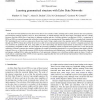Free Online Productivity Tools
i2Speak
i2Symbol
i2OCR
iTex2Img
iWeb2Print
iWeb2Shot
i2Type
iPdf2Split
iPdf2Merge
i2Bopomofo
i2Arabic
i2Style
i2Image
i2PDF
iLatex2Rtf
Sci2ools
116
click to vote
NN
2007
Springer
2007
Springer
Learning grammatical structure with Echo State Networks
Echo State Networks (ESNs) have been shown to be effective for a number of tasks, including motor control, dynamic time series prediction, and memorizing musical sequences. However, their performance on natural language tasks has been largely unexplored until now. Simple Recurrent Networks (SRNs) have a long history in language modeling and show a striking similarity in architecture to ESNs. A comparison of SRNs and ESNs on a natural language task is therefore a natural choice for experimentation. Elman applies SRNs to a standard task in statistical NLP: predicting the next word in a corpus, given the previous words. Using a simple context-free grammar and an SRN with backpropagation through time (BPTT), Elman showed that the network was able to learn internal representations that were sensitive to linguistic processes that were useful for the prediction task. Here, using ESNs, we show that training such internal representations is unnecessary to achieve levels of performance comparab...
Echo State Networks | Internal Representations | Natural Language Task | Neural Networks | NN 2007 |
Related Content
| Added | 27 Dec 2010 |
| Updated | 27 Dec 2010 |
| Type | Journal |
| Year | 2007 |
| Where | NN |
| Authors | Matthew H. Tong, Adam D. Bickett, Eric M. Christiansen, Garrison W. Cottrell |
Comments (0)

